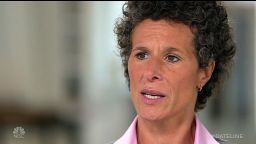Story highlights
Why does it often take so long for people to speak up? Here's what we've learned from people who recently came forward.
The news has been filled with stories of prominent men accused of sexual misconduct – many of the alleged misdeeds going back decades.
The circumstances are different in each case, but we often hear the same question: Why did the accusers wait so long to come forward? Even US President Trump posed the question in the case of Judge Brett Kavanaugh, nominee to the US Supreme Court, who is accused of sexually and physically assaulting a woman more than 30 years ago.
Some explained their reasons for waiting. In other cases, the treatment accusers endured after coming forward made their reasons apparent. Here are a few examples:
They lose their privacy
Christine Blasey Ford tried to keep her allegations against Kavanaugh confidential, fearing that publicly accusing the Republican nominee “would upend her life,” according to the Washington Post.
Within 48 hours of coming forward, her lawyers say her fears were realized to the extreme.
Now, Ford is under pressure to defend her allegations before the Senate Judiciary Committee while trying to figure out how to keep her family safe.
“She has been deflecting death threats and harassment and trying to care for her family and determine where they’re going to sleep at night,” attorney Lisa Banks told CNN.
They think no one will believe them
Another lawyer, Debra Katz, advised Ford to take a polygraph test, suspecting that people would call Ford a liar if she came forward. Now, just as Katz predicted, it’s Ford’s word against Kavanaugh’s.
Katz provided the results to The Post, the paper said. They concluded that Ford “was being truthful when she said a statement summarizing her allegations was accurate,” according to the article.
“She’s now going to have to live with the tremendous efforts by people to discredit her,” Katz told CNN. “She’s telling the truth. She took a polygraph and mentioned this in her therapy sessions in 2012, and she came forward before this nominee was nominated.”
Their names will be dragged through the mud
In a victim impact statement, Andrea Costand recalled the “slander campaign” she endured after she disclosed rape allegations against Bill Cosby.
“I was called a gold digger, a con artist, and a pathological liar. My hard-working middle class parents were accused of trying to get money from a rich and famous man.”

Anita Hill endured vicious character attacks during and after she testified in Supreme Court Justice Clarence Thomas’ nomination hearings. She accused him of sexually harassing her as her supervisor at Department of Education and the Equal Employment Opportunity Commission.
One of her most infamous detractors, conservative operative David Brock, called Hill “a little bit nutty and a little bit slutty” in a piece for the American Spectator, titled “The Real Anita Hill.” In a book by the same name, he called her “obsessed with sex” and “the world’s kinkiest professor,” only to later recant the outrageous claims.

Rachael Denhollander, one of the first women to publicly accuse former sports doctor Larry Nassar of assault, said she kept silent for years because she saw how other accusers were treated.
“… I watched family and friends eviscerate sexual assault victims who spoke up against a candidate, team, pastor, ministry or local friend they liked, and I got the message loud and clear,” Denhollander said Monday on Twitter.
“I watched them denigrate the victim’s character, motives, truthfulness, and value some political, sport or ministry goal more than the truth. Completely blinded to even the possibility it could be true. It felt like a knife wound every time I saw it.”
Their motives are questioned
When the Washington Post published accounts from four women who said Alabama Senate candidate Roy Moore pursued them as teenagers, Moore’s supporters said they found the timing “suspect.” The Senate race was just weeks away, leading many, including Moore’s wife, to accuse the women of conspiring with the “liberal press” to get “involved” with the race.
Moore denied the allegations.
The Washington Post said none of the women approached the paper with the story. On the contrary, the paper approached the women after receiving a tip and asked them to come forward.
They fear professional consequences
According to The New Yorker, six women who had professional interactions with former CBS executive Les Moonves said he became “cold or hostile” after they rejected his advances.
Moonves denies allegations that he abused his position of influence to coerce female actresses and producers into unwanted sexual activity. But the women said they believed their careers suffered as a result; two of them claim that Moonves threatened to derail their careers, according to the magazine.
Numerous Harvey Weinstein accusers also said they stayed quiet for fear of the consequences of challenging a man who held their career in his hands.
In her account of Weinstein’s alleged harassment, actress Gwyneth Paltrow said she feared the repercussions for her career if she were to speak out. After her then-boyfriend, Brad Pitt, confronted Weinstein, the Miramax producer warned her not to tell anyone else, she told The New York Times.
“I thought he was going to fire me,” she said.
Actor Terry Crews expressed a similar sentiment when he went he public in October with allegations that an unnamed Hollywood executive groped him. The executive apologized “but never really explained why he did what he did,” Crews said on Twitter in October.
“I decided not to take it further because I didn’t want to be ostracized – par for the course when the predator has power and influence,” he said.
They blame themselves
Andrea Constand said she struggled for years over whether to report Cosby for drugging and raping her.
“The shame was overwhelming. Self-doubt and confusion kept me from turning to my family or friends as I normally did. I felt completely alone, unable to trust anyone, including myself.”

American gymnast Simone Biles has described the guilt victims carry around after being violated.
The Olympic champion said she was also sexually abused by Nassar, the former USA gymnastics team doctor who admitted to taking advantage of young female athletes in his care.
Before speaking up, Biles said she grappled with whether she could have done something to prevent what happened, even though she did nothing to cause it.
“For far too long I’ve asked myself ‘Was I too naive? Was it my fault?’” she said in January.
“I now know the answer to those questions. No. No. It was not my fault. No, I will not and should not carry the guilt that belongs to Larry Nassar, USAG and others.”
They worry that their past will be used against them
One of Moore’s accusers told the Washington Post that she didn’t come forward sooner because she worried that her background, which included three divorces and financial troubles, would undermine her credibility.
Get CNN Health's weekly newsletter
Sign up here to get The Results Are In with Dr. Sanjay Gupta every Tuesday from the CNN Health team.
“There is no one here that doesn’t know that I’m not an angel,” Leigh Corfman said, referring to her home town of Gadsden, Alabama.
Corfman has since filed a defamation lawsuit against Moore and his campaign for calling her allegations “politically motivated” and “malicious.”
What to do if you are a victim or a survivor
Ford’s lawyer has said survivors should be able to choose if and when to come forward, and experts agree.
Each person deals with trauma in a different way, and it should be up to an individual to decide how they want to move forward.
Experts recommend finding someone to talk through possible scenarios. It could be someone you know and trust not to act on your behalf without your say-so, such as a friend, a relative or a coworker. Or it could be someone on the end of a hotline or a local resource in your community.
Anyone affected by sexual violence can reach out to the National Sexual Assault Hotline at 800-656-HOPE (4673) or visit online.rainn.org to receive support via confidential online chat.






















